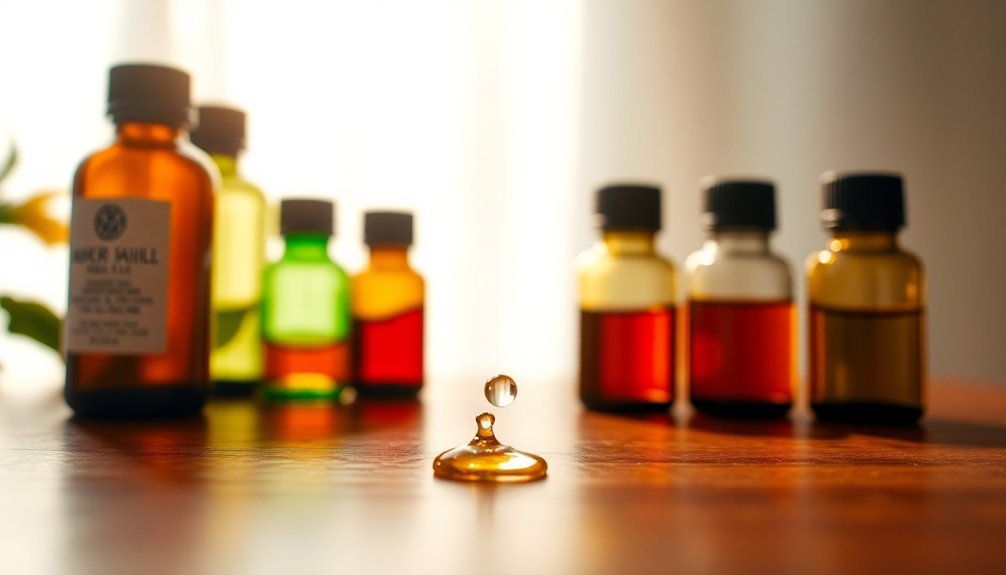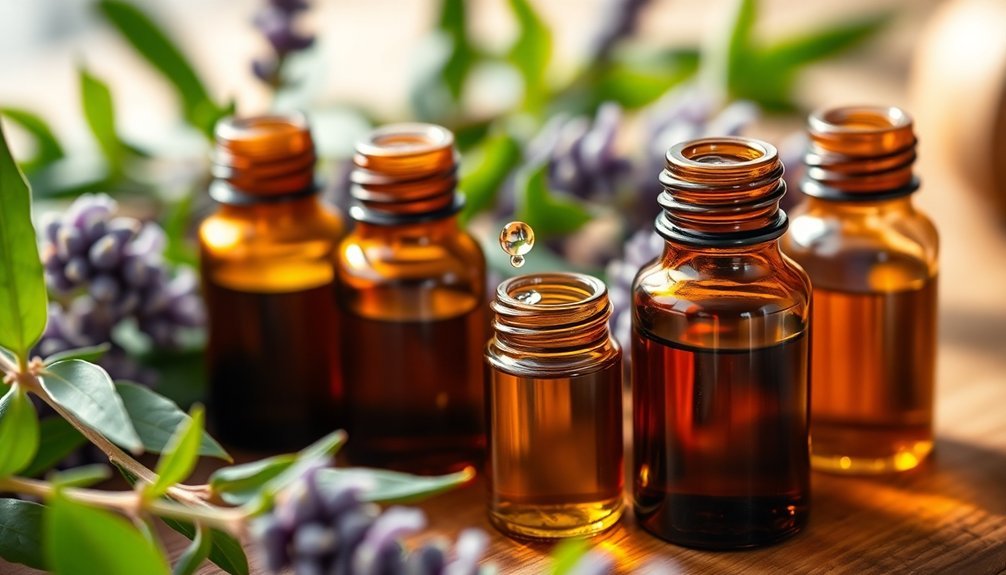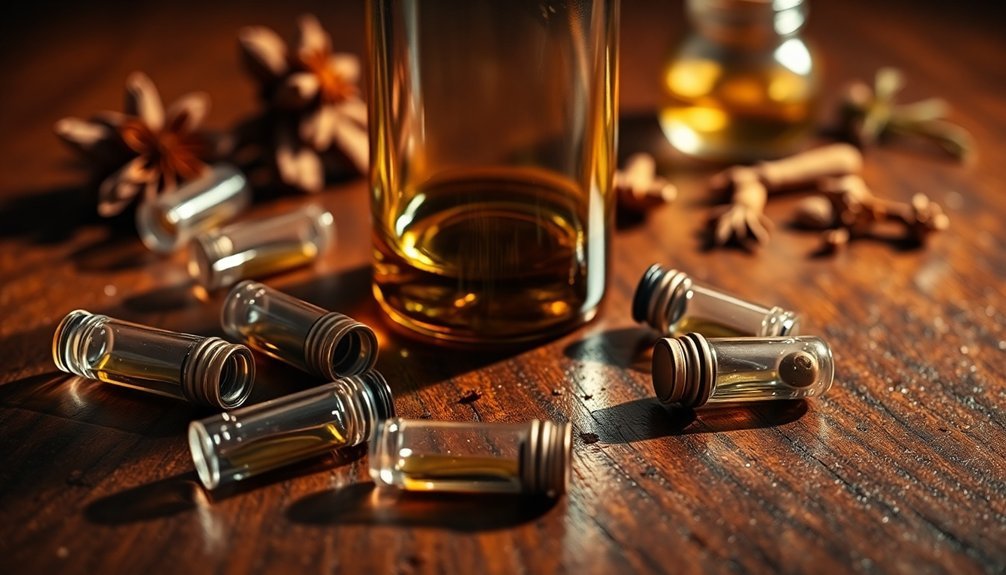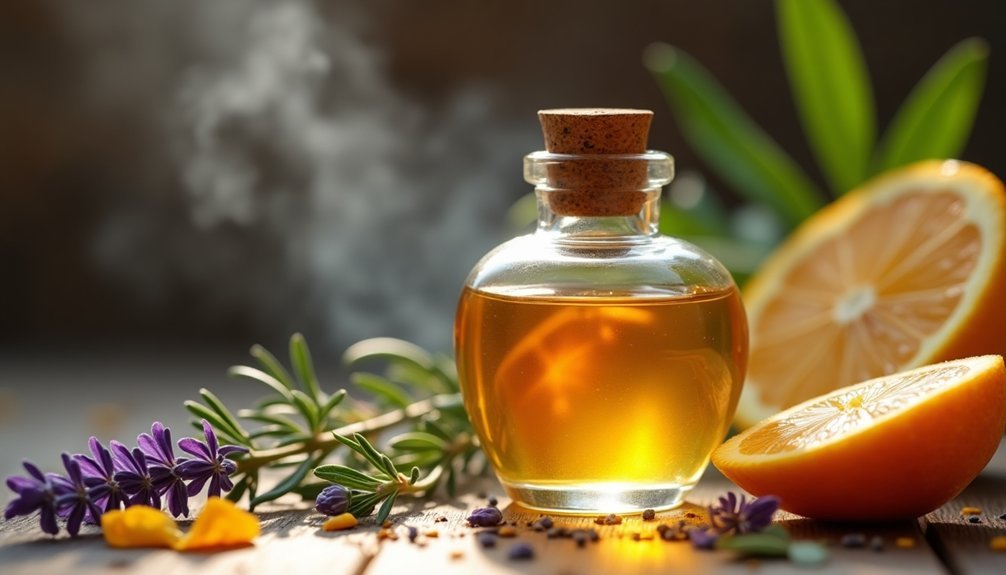Your oil fragrances won't last all day because they're fighting against several factors working against them. Your skin's chemistry, temperature, and humidity levels all affect how quickly the fragrance molecules evaporate and break down. Plus, improper storage and application techniques can greatly reduce their staying power. Even high-quality oils need the right conditions and application methods to perform their best – and there's a science to making them last longer.
Understanding Your Skin's Chemistry and Its Impact on Fragrance

When it comes to wearing oil fragrances, your skin's unique chemistry plays a crucial role in how long the scent will last. Your skin's pH level directly affects how fragrance molecules bind, and if your skin is too acidic or alkaline, it can cause the scent to break down faster than expected.
If you have naturally oily skin, you'll notice your fragrance fading more quickly as your body chemistry interacts with the scent molecules. Conversely, if your skin tends to be dry, it might quickly absorb the oil-based fragrance, reducing its longevity.
To maximize your fragrance's staying power, it's important to properly hydrate your skin and consider environmental factors like humidity and temperature. Understanding these aspects of your body chemistry can help you choose fragrances specifically formulated for better lasting power.
The Role of Proper Storage in Oil Fragrance Longevity
Proper storage of your oil fragrances can mean the difference between a long-lasting signature scent and a spoiled investment. To prevent chemical breakdown, you'll want to keep your fragrances in a cool, dark place away from direct sunlight and heat sources.
Don't store your precious scents in high-humidity areas like your bathroom, as moisture can compromise their formulation. Always keep bottles tightly sealed when you're not using them to prevent oxidation, which can drastically alter the fragrance's quality.
Since oil fragrances typically have a shelf life of just over a year, you'll need to monitor them regularly for any changes in color or scent that might indicate expiration. By following these storage guidelines, you'll help maintain your fragrance's integrity and extend its longevity.
Essential Carrier Oils for Extended Scent Duration

To maximize your fragrance's longevity, strategic use of carrier oils can make all the difference. High-quality carrier oils like jojoba and sweet almond create a protective barrier that helps your essential oils last longer on your skin.
Jojoba oil is particularly effective because it mimics your skin's natural oils, allowing fragrance oils to bind more securely.
You'll get better scent retention when you apply your fragrances to hydrated skin mixed with carrier oils, rather than dry skin. This combination creates the perfect foundation for your scent to linger throughout the day.
When you blend essential oils with carrier oils, you're also helping to stabilize the fragrance, preventing it from breaking down due to skin chemistry or environmental factors.
Strategic Application Points for Maximum Staying Power
The strategic placement of oil fragrances on your body can considerably impact their staying power throughout the day.
You'll want to focus on pulse points like your wrists, neck, inside elbows, and behind your ears, where natural body heat helps diffuse the scent effectively.
Before applying your fragrance, moisturize your skin to create a protective barrier that prevents quick absorption.
Consider layering with a matching scented body lotion to build a stronger foundation for your fragrance.
When it comes to application technique, remember to dab rather than rub the oil to preserve its integrity and prevent premature evaporation of top notes.
You'll also want to pay attention to environmental factors – applying your fragrance in cooler, less humid conditions can help maximize its longevity.
Common Mistakes That Diminish Oil Fragrance Performance

Many fragrance enthusiasts unknowingly sabotage their oil perfumes' longevity through common application mistakes. You might be applying perfume to dry skin, which doesn't hold the scent as effectively as moisturized skin.
Consider using unscented lotion first to create a base that helps your skin hold the fragrance longer.
You're also likely over-applying your body oil, thinking more is better. This actually causes the scent to fade faster rather than last longer.
Another mistake is skipping proper layering techniques with complementary products that could enhance your fragrance's staying power.
Don't forget about storage – keeping your oils in places with extreme temperatures or direct sunlight can weaken their potency. Instead, store them in cool, dark spaces and target pulse points when applying to maximize their performance throughout the day.
Natural Methods to Enhance Scent Retention
You'll get the most out of your oil fragrances by moisturizing your skin before application, as hydrated skin creates an effective base that holds onto scents longer.
Targeting your pulse points, including your wrists and neck, allows your natural body heat to activate and diffuse the fragrance throughout the day.
For best results, pair these practices with a complementary scented body lotion to create a lasting aromatic foundation.
Moisturize Before Oil Application
Since ideal fragrance retention relies heavily on skin hydration, moisturizing before applying oil fragrances can dramatically extend their staying power.
Your skin's natural moisture barrier plays a vital role in fragrance retention, and you'll get better results when you prep your skin properly.
To maximize the longevity of your oil fragrances:
- Apply unscented body lotion immediately after showering while your pores are still open.
- Use heavy moisturizers or body oils as a base layer to create an adhesive surface.
- Focus on moisturizing pulse points where you'll apply the fragrance.
- Wait a few minutes after moisturizing to let your hydrated skin form a proper barrier.
This preparation method creates the perfect foundation for your oil fragrances, helping them bind better and last longer throughout your day.
Target Your Pulse Points
Strategic placement of oil fragrances on pulse points creates a natural diffusion system that works with your body chemistry. Your wrists, neck, and behind your ears have thinner skin and naturally elevated temperatures, making them ideal spots for fragrance application.
To maximize your scent's longevity, don't rub the essential oil into your pulse points. Instead, gently dab or tap the fragrance to preserve its molecular structure. When you rub, you'll break down the scent compounds, causing them to evaporate more quickly.
For best results, apply your oil fragrance right after moisturizing these areas. The moisturizer creates a protective barrier that helps lock in the scent, while your pulse points' natural warmth gradually releases the fragrance throughout the day.
The Science Behind Oil-Based vs. Alcohol-Based Fragrances
While both oil-based and alcohol-based fragrances have their merits, the science behind their performance reveals distinct differences in how they interact with your skin.
Oil-based fragrances contain a higher concentration of fragrance, typically 50-100%, which helps them bond with your skin's natural oils for enhanced longevity of the scent.
- Oil-based fragrances bind more effectively to your skin, creating a subtle, lasting aroma
- Alcohol-based fragrances project strongly at first but evaporate quickly due to their volatile nature
- Environmental factors affect alcohol-based scents more notably than oil-based ones
- The molecular structure of oils allows for slower, more controlled scent release over time
Despite higher oil concentrations, other factors like application technique and skin chemistry still play vital roles in how long your fragrance will last.
Weather and Environmental Effects on Oil Fragrances
Your oil fragrance's performance is heavily influenced by the weather and environment around you.
When temperatures rise, your fragrance molecules move more quickly and evaporate faster from your skin, greatly reducing their staying power.
High humidity can further alter your fragrance's character by affecting how the scent molecules interact with the air and your skin's chemistry.
Heat Accelerates Scent Evaporation
Heat plays a significant role in diminishing the longevity of oil fragrances, as warmer temperatures speed up molecular evaporation. When you're exposed to higher temperatures or humidity, your fragrance oils will dissipate more quickly, leaving you wondering why your scent isn't lasting.
Here's how heat affects your fragrance's longevity:
- Increased temperature accelerates the evaporation of fragrance molecules, causing your scent to fade faster.
- High humidity dilutes your fragrance oils and reduces their ability to cling to your skin.
- Lighter scent notes, especially citrus and florals, evaporate more rapidly in warm conditions.
- Storing fragrances in warm areas or direct sunlight compromises their potency.
To maximize your fragrance's staying power, you'll want to apply it in cooler environments and store it away from heat sources.
Humidity Changes Fragrance Profile
Just as temperature affects fragrance longevity, humidity levels can dramatically alter how your oil fragrances perform throughout the day.
When you're in a humid environment, your favorite scent may not last as long as you'd expect, since moisture in the air causes fragrance molecules to evaporate more quickly.
Your skin's natural response to humidity complicates matters further.
In moist conditions, your skin produces additional oils that interact with the fragrance's composition, often resulting in an unexpected scent profile.
You'll notice that lighter top notes fade faster, leaving you with a less complex fragrance experience.
The high moisture content in the air also affects how the scent bonds with your skin, leading to faster absorption and reduced longevity.
This means you might need to reapply your fragrance more frequently in humid weather.
Layering Techniques for Lasting Scent Impact
When it comes to maximizing fragrance longevity, strategic layering can transform a fleeting scent into an all-day experience. To boost your perfume's staying power, start with an unscented moisturizer to create a hydrated base that grips fragrance molecules.
Strategic fragrance layering begins with moisturized skin, creating the perfect canvas for long-lasting scent retention throughout your day.
Then, build your cohesive scent profile through careful product selection.
Follow these steps to prevent scent muddling while maximizing impact:
- Apply rich, unscented moisturizer as your foundation
- Layer complementary scented body products that share similar notes
- Add your signature fragrance or high-quality roll-on oil
- Finish with a light mist of matching body spray
Remember to limit your layering to three products maximum. This approach guarantees each layer works harmoniously to create a lasting impression without overwhelming your senses or competing with one another.
Selecting Quality Base Notes for Extended Wear Time
When choosing an oil fragrance that lasts, you'll want to focus on the base notes, which include rich ingredients like vanilla, sandalwood, and musk that extend wear time.
Your fragrance should contain at least 30% base notes to create a strong foundation that anchors the scent to your skin throughout the day.
You can maximize longevity by layering your oil fragrance with matching body products that share complementary base notes, creating a more persistent scent experience.
Base Notes Matter Most
Although top notes create the initial impression, base notes are the true powerhouse of any long-lasting oil fragrance.
When you're selecting fragrance oils, understanding the role of high-quality base notes can make the difference between a scent that fades quickly and one that lasts all day.
For maximum extended wear time, consider these essential factors:
- Choose fragrances with 50-70% base note concentration for ideal lasting power
- Look for natural ingredients like vanilla, sandalwood, and amber in the composition
- Prioritize oils with lower volatility rates to guarantee slower evaporation
- Select scents featuring essential oils over synthetic compounds
The key to achieving all-day wear lies in the quality of your base notes.
They'll anchor your fragrance and maintain its integrity hours after application, making them the most vital component of any lasting scent.
Layering Creates Lasting Power
Smart layering techniques can dramatically improve your fragrance's staying power, especially when you combine complementary base notes. When you're selecting fragrances to layer, look for those containing vanilla, sandalwood, amber, or musk as these base notes are known to enhance longevity.
Start by applying a fragrance oil directly to your skin, which creates an adhesive foundation for your perfume.
Then, apply a scented body lotion that shares similar base notes with your chosen fragrance. This multi-step approach helps lock in the scent throughout the day.
For maximum impact, choose parfum formulations, as they contain higher concentrations of long-lasting base notes.
Frequently Asked Questions
How to Make Oil Perfume Last All Day?
Apply oil perfume to moisturized skin at pulse points, and layer with matching scented lotions. Store fragrances properly in cool, dark places, and choose high-quality oils with concentrated formulas for longer-lasting scents.
Why Does My Perfume Oil Not Last Long?
Your perfume oil's short lifespan could be due to your dry skin type, body chemistry, poor application techniques, or low-quality oils. Environmental factors like heat and humidity can also make fragrances fade faster.
Why Can't I Smell My Perfume All Day?
You're likely experiencing olfactory fatigue, where your nose adapts to the scent. Your perfume may still be there, but your brain stops registering it. Others might still smell it on you.
Why Does My Perfume Wear off so Quickly?
Your perfume's quick fade may be due to your skin type, daily activities, and the fragrance's concentration. You'll notice faster wear-off with oily skin, high temperatures, or if you're using lower-concentration scents.
In Summary
You'll get the most from your oil fragrances by understanding your skin's chemistry, properly storing your scents, and using strategic application techniques. Don't forget to layer your fragrances and choose quality base notes for longer-lasting wear. With the right combination of carrier oils and proper application points, you'll enjoy your favorite scents throughout the day. Remember, external factors like weather can affect longevity, so adjust accordingly.





Leave a Reply